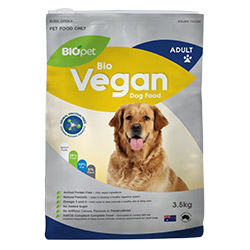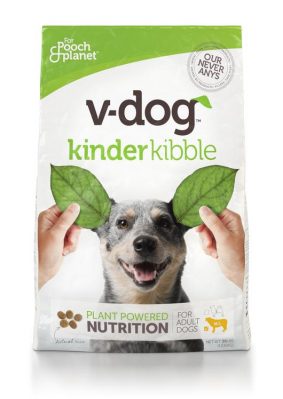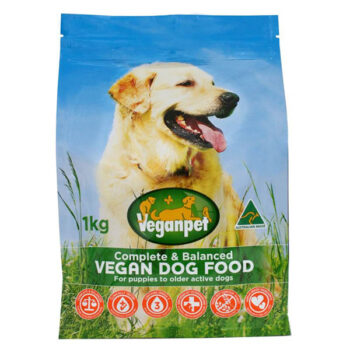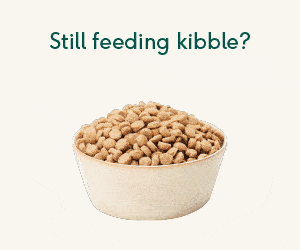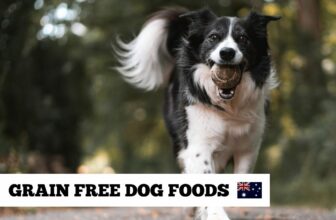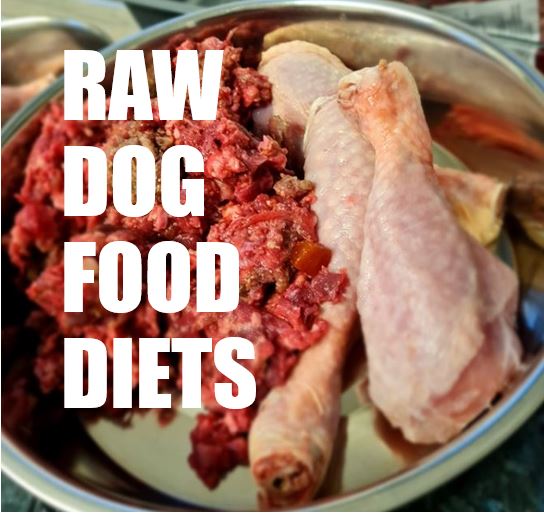Recent years has shown more and more Australians embrace vegetarian and vegan lifestyles.
Some turn to vegetarian and vegan diets for their dogs (and cats) as well, but how do you know which to choose and which to avoid?
Please note as a certified pet nutritionist with many years exposure to the Australian pet food industry I must state I consider dogs as carnivores as well as cats. I therefore would not recommend feeding a dog a vegetarian or vegan pet food. However, I will admit the possibility of a vegetarian/vegan pet foods being better than numerous carbohydrate-based kibbles (often misrepresented as “meat-based”).
Let’s take a look at the vegetarian and vegan dog foods available in Australia:
Research of Vegetarian & Vegan Nutrition
You will find research available which suggests vegan pet foods can be better than “meat-based” pet foods.
One such 2023 study from Griffith University in Queensland has suggested this, but on closer inspection appears fundamentally flawed. The study compares cats fed a vegan diet compared to cats fed a “meat-based” diet, without any consideration to those meat-based cat foods not actually being meat based.
This is the trouble with research in the field of pet nutrition, and a cause for harmful misinformation.
To reiterate, this means studies such as this are not a true representation of plant-based versus real meat-based pet foods.
I often find studies in pet nutrition are often funded by industry. This means a conflict of interest, and the most likely purpose being to convince you to buy a product.
Vegetarian & Vegan Dog Foods in Australia
Below are the leading vegetarian and vegan dog foods in Australia:
Alternatives to vegetarian and vegan dog foods – pescetarian dog foods?
If you’re willing to compromise a little then there are some great pescetarian dog foods.
Feeding a pescetarian dog food over a vegan dog food may meet your dog’s dietary needs a little better. Fish contains essential nutrients such as omega-3 fatty acids and high-quality protein which are important for a dog’s overall health and well-being.
Accepting pescetarian options for your dog gives you more options, including brands which are well respected and reputable worldwide. Two good choices are the Taste of the Wild and Canidae Pure brands – well worth considering, even as part of your dog’s diet.
While some dogs are said to thrive on a well-balanced vegan diet, others may require the specific nutrients found in animal products to maintain optimal health. This makes pescetarian dog food a potentially more suitable, or less risky choice for their nutritional requirements.
You may also be willing to consider insect protein as an option, which is a more sustainable form of animal protein.
Are vegan dog foods good for allergies and dietary sensitivities?
It is true a vegan dog food may help alleviate your dog’s allergies.
We often hear the word “allergy” in relation to itchy skin, yeasty ears, hot spots, or gastrointestinal issues and diarrhea. These are more correctly termed as dietary sensitivities, and many dog foods contain ingredients a dog should not really be eating anyway. In short, it means they are reacting to inappropriate ingredients.
Simply removing problematic ingredients can rectify these symptoms.
Many consider the new diet the solution – such as a vegan dog food or a hypoallergenic, veterinary-endorsed dog food – but these shouldn’t be considered miracle cures. They just don’t contain common causes of sensitivity such as wheat, cereals, cereal by-products, poor quality meat, or specific animal proteins.
Final thoughts on vegetarian and vegan dog foods
Remember to consult with your veterinarian before making any significant changes to your dog’s diet, especially if you’re considering transitioning to a vegetarian or vegan dog food.
It is important to understand nutritional deficiencies and health conditions can take a long time before symptoms are visible. Any veterinarian will tell you how often symptoms of illness are missed. For this reason we must have confidence we are feeding our pets all the nutrition they require.
If your dog displays any symptoms whatsoever, or you have the slightest concerns, I advise booking a check-up with your veterinarian. Inform them of the diet and request blood tests – this is the best way forward to address any possible issues with a vegetarian or vegan diet, and allow you to research available supplements or solutions.

